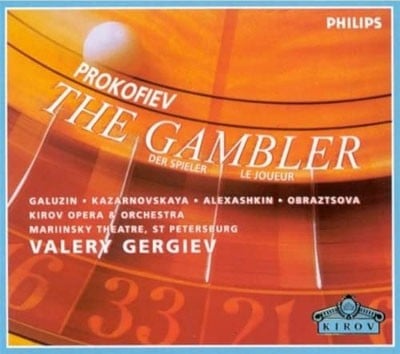OPERA SEARCH

The Gambler
(1915-17, rev.1927-28)Libretto by the composer after the novel by Dostoevsky (R,E,F,G,I)
Major roles: S,M,A,2T,Bar,B;
minor roles: 2S,2M,A,Tfalsetto,7T,4Bar,7B,mimes
2.picc.2.corA.2.bcl.2.dbn-4.3.3.1-timp.perc:cyms/BD/t.mil/tgl-
2harp-pft-strings
Abbreviations (PDF)
Boosey & Hawkes
Théâtre Royal de la Monnaie, Brussels
Conductor: Corneil de Thoran
Company: Théâtre de la Monnaie
| THE GENERAL, a retired army-officer (55) | Bass |
| PAULINE, his step-daughter | Soprano |
| ALEXEY, tutor to the General's children (25) | Tenor |
| 'BABULENKA', the General's rich aunt | Mezzo Soprano |
| THE MARQUIS | Tenor |
| MR ASTLEY, a rich Englishman | Baritone |
| BLANCHE, a demi-mondaine (25) | Contralto |
| PRINCE NILSKY | Tenor |
| BARON WURMERHELM (45) | Bass |
| BARONESS WURMERHELM | Mute |
| POTAPICH, Babulenka's steward | Baritone |
| THE DIRECTOR | Bass |
| THE FIRST CROUPIER | Tenor |
| THE SECOND CROUPIER | Tenor |
| THE FAT ENGLISHMAN | Bass |
| THE TALL ENGLISHMAN | Bass |
| THE FLORID LADY | Soprano |
| THE PALE LADY | Mezzo Soprano |
| A RESPECTABLE OLD LADY | Mezzo Soprano |
| A SUSPICIOUS OLD LADY | Contralto |
| A HEATED GAMBLER | Tenor |
| A GAMBLER IN ILL-HEALTH | Tenor |
| A HUNCH-BACKED GAMBLER | Tenor |
| AN UNLUCKY GAMBLER | Baritone |
| AN OLD GAMBLER | Bass |
| Six Gamblers | 2 Tenors, 2 Baritones, 2 Basses |
| The Head-Waiter, the Page Boy, Babulenka's 3 Servants, Gambers, People staying in the Hotel, Servants, Porters |
The Imaginary Town of Roulettenburg, 1865
A group of gamblers are staying in the German town of Roulettenburg. These include a retired Russian general, his step-daughter Pauline, and his young children’s tutor Alexei. The general is in debt to a French marquis, and is pursued by the manipulative social-climber Blanche. Both know that he hopes to inherit a fortune from his elderly aunt Babulenka. Alexei is gambling with Paulina’s money, acting as her agent but losing badly, and they are tied together by a complex love-hate relationship. She constantly tries to humiliate him and when she makes him insult a German baroness, the general dismisses him for his misbehaviour. Alexei learns from an Englishman that the general is in debt, that Pauline may also benefit from Babulenka’s will, and that the marquis may have intentions towards Pauline. Babulenka unexpectedly arrives. Far from ill, the old lady promptly heads for the gambling tables, spurning the general, and taking Alexei with her instead. To everyone’s horror, she loses most of her fortune and returns to Moscow, leaving the general with no hope of money. Blanche abandons the general for another Russian aristocrat and the marquis decides to call in his debts. Pauline now confides to Alexei that she has already been seduced and betrayed by the marquis, but still loves him. The marquis however feels nothing for her and has salved his conscience only by transferring to her part of the general’s debts. Alexei, despairing, runs to the casino, where he suddenly finds himself winning enormous riches. These he offers to Pauline with his love. But Pauline, though intensely drawn, sees in this situation only further humiliation. She hurls the money in his face and leaves him forever.
Prokofieff’s The Gambler can be viewed as the culmination of the composer’s early radical and experimental period, with its mechanistic ostinatos and febrile energy, perfectly attuned to Dostoyevsky’s study of obsession. The casino, as a potent symbol of unexpected financial gain or ruin, emerges in the final act as the central character of the opera, controlling the destiny of all those that are drawn to the gambling tables, like moths to a flame. Prokofieff intended the work as a reaction against Romantic lyricism, instead preferring to create "an opera in the declamatory style", closer in technique to the stageworks of Dargomyzhsky and Mussorgsky which set musical prose in natural speech rhythms. The Gambler provides an opera company with a potential ensemble showcase, from the two main roles of Alexei and Pauline calling for top rank singing actors, through a gallery of cameo characters, to opportunities for members of the chorus in the casino tableau. From the opening bars the work also announces a crucial role for the orchestra, driving the action forward, and depicting in swirling splashes of colour the fateful spinning of the roulette wheel.
Comic, Dramatic

Vladimir Galuzin/Liubov Kazarnovskaya/Sergei Alexashkin/Elena Obraztsova/Kirov Opera/Valery Gergiev
Philips 454 559 (2 CDs)
